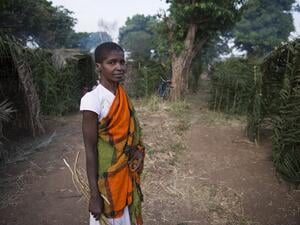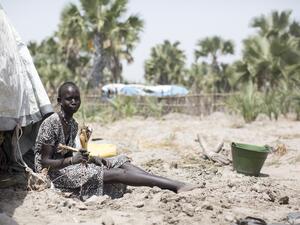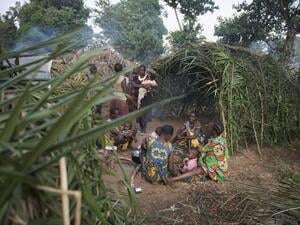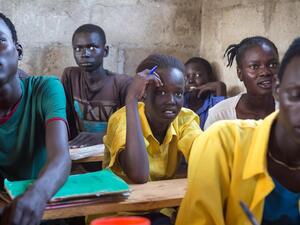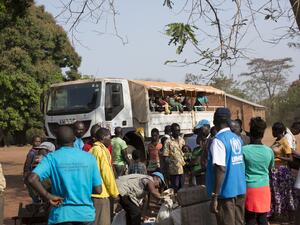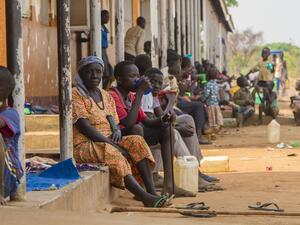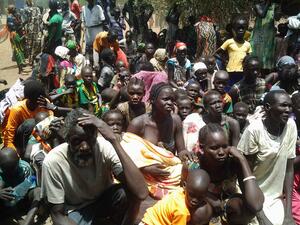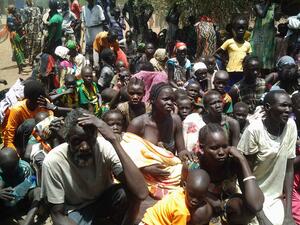Sudanese villagers face tough choices before fleeing to relative safety in Yida
Sudanese villagers face tough choices before fleeing to relative safety in Yida

Amuna and her family at the registration centre in Yida.
YIDA, South Sudan, October 9 (UNHCR) - It was a terrible dilemma for the mother of four - which children to take and who to leave behind as the fighting approached her village. Amuna realized that it was only a matter of time before the Antonovs started bombing Timodongo in Sudan's South Kordofan state and she would have to flee - or risk death by staying.
"We had to get to Yida," she told UNHCR at this remote refugee settlement that has become home to tens of thousands of people in South Sudan's Unity state. But her two youngest children, five-year-old Ali Amou and Kadimala, aged three, were too small and weak to make the arduous two-day journey to Yida in South Sudan on foot. Yet she could not carry them and look after her two eldest at the same time.
In the end, she decided to leave Ali Amou with her sister in the village, but it was a heart-wrenching decision and she told UNHCR at Yida's registration centre that she worried all the time about her young boy.
Her ordeal is shared by others forced to leave behind vulnerable family members in the rush to flee South Kordofan to escape attacks on villages and towns across the border in the Nuba Mountains. Food shortages are compounding the situation, with stocks of the staple, sorghum, reportedly damaged in the fighting and air raids. Many farmers, moreover, have told UNHCR that they are too scared to work in the open fields and much of last season's harvest was lost, affecting Amuna's family and many others.
"A few months ago, most new refugees were arriving in poor health because of massive food shortages caused by a year of fighting," Alessandro Telo, a UNHCR registration officer, noted. "Now, they are arriving with nothing but the clothes on their backs and they say they are fleeing from intensified bombing and insecurity."
Some 63,000 people have fled over the past 13 months from the violence and hunger in South Kordofan and made their way to Yida, located close to the border and surrounded by marshes in one of the most remote areas of South Sudan.
About 100 refugees arrive every day but the number is expected to soon rise when the weather changes. "The end of the rainy season is approaching and with the roads reopening we are expecting many more refugees to arrive in Yida," said Marie-Helene Verney, head of the UNHCR team in Unity state.
But Yida is also perilously close to the border and was bombed from the air last year. Verney said UNHCR's "main priority is to quickly identify additional sites further away from the border for the new arrivals."
With the possibility of a sharp spike in the number of arrivals, this task has taken on more urgency. Moreover, all life-saving aid, equipment and personnel has to be flown to Yida because of its isolation and the difficulty of access. Another mass influx of arrivals will exacerbate logistical challenges in an already strained operation.
"We are working urgently to pre-position supplies to plan for the surge, but we need additional support because our existing stocks can only meet the needs of the current population," Verney explained. The need for health and hygiene support as well as access to clean drinking water is acute.
Despite the problems at Yida and its proximity to the militarized border, Amuna felt it was safer than South Kordofan. Her priority was to build a shelter for herself and her children. It wasn't the first time she had been forced to flee. In July 2011, her native town of Buram came under attack. "We first ran because of the Antonovs. Bombs were falling,"Amuna recalled. "I grabbed my children and we ran. We have never gone back."
Amuna and her family fled up into the Nuba Mountains, where they lived in caves and survived on leaves and sorghum. After a week, they trekked south to Timodongo. They felt safer there, but food shortages became a problem.
Then the air raids started to come closer to Timodongo and, Amuna said, it was not a matter of if the conflict would come to the village, but when.
On arrival In Yida, she and the children were registered as refugees, underwent medical screening and received food rations and aid items. including jerry cans to store water. UNHCR has also distributed thousands of mosquito nets and plastic sheets in recent weeks for new arrivals.
Relatively safe and settled in Yida, Amuna now scans new arrivals, hoping that her missing boy will be among them. "I will wait impatiently until my son and sister make it. I hope they make it."
South Sudan hosts some 200,000 refugees, including more than 170,000 in Unity and Upper Nile states. UNHCR urgently needs US$20 million to prepare for new arrivals in the coming weeks. The refugee agency has so far received US$71 million and calls on governments, the private sector and individuals for support.
By Kathryn Mahoney in Yida, South Sudan

